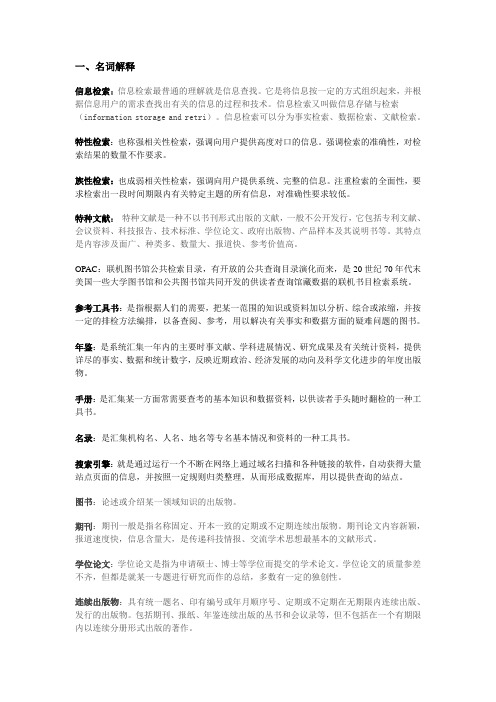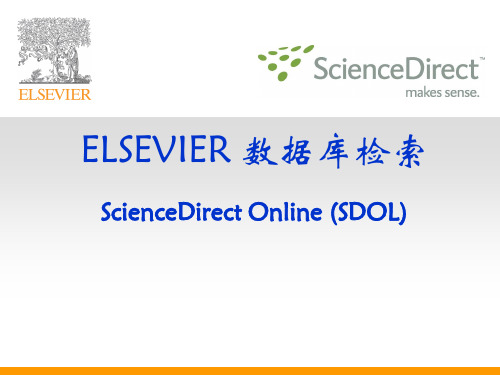信息检索 英文全文数据库——Elsevier
数据库检索指南Elsevier(ScienceDirect)全文数据库

数据库检索指南Elsevier(ScienceDirect)全文数据库数据库检索指南Elsevier(ScienceDirect)全文数据库Elsevier数据库简介Elsevier是一家经营科学、技术和医学信息产品及出版服务的世界一流出版集团,是励德爱思唯尔集团的一部分,总部设立在荷兰的阿姆斯特丹,7000多个员工分布在全球各地70多个分支机构。
通过与全球的科技与医学机构合作,公司每年出版2000多种期刊和1900种新书,以及一系列创新性的电子产品。
SD(ScienceDirect)是Elsevier公司的核心产品,是全学科的全文数据库,集世界领先的经同行评审的科技和医学信息之大成,得到70多个国家认可,中国有超过200个高校订购了SD,每月下载量高达250万篇。
期刊2200多种,24个学科领域,其中SCI收录刊1375,EI 收录刊522,700多万篇全文,包括在编文章;图书2000多种,包括常用参考书、系列丛书、手册。
文献有HTML和PDF两种格式,及时获取在编文章。
数据回溯时间长,最早回溯至1823年创刊号,订购用户可以看到1995年以来的数据。
ScienceDriect收录学科物理学和天文学能源和动力农业和生物科学工程和技术生物化学、遗传学和分子生物学环境科学商业、管理和财会免疫学和微生物学化学工程学材料科学化学数学计算机科学医学决策科学神经系统科学地球和行星学药理学、毒理学和制药学经济学、计量经济学和金融社会科学心理学红色为我校购买学科ScienceDirect检索方式直接浏览快速检索高级检索专业检索图书馆主页电子资源外文数据库ElsevierScienceDirect主页SD直接浏览按学科浏览按字顺浏览SD按字顺浏览(A开头的出版物)选择学科出版类型可否获得全文SD按学科浏览(人文社会科学)SD按学科浏览(人文社会科学)该学科下出版物按名称字母顺序排列文献类型为图书的显示界面图书基本信息图书目录图书内容简介文献类型为期刊的显示界面期刊基本信息往期目录本期目录下载全文(pdf格式)全文显示SD快速检索输入检索词检索文章:在输入检索词时可以使用通配符?和。
文献检索5-elsiver及投稿流程

Cover letter
仔细核对生成的PDF文档,如果错误,重新上传,重新生成
需到通讯联系人登陆界面
提交之后
立即收到投稿确认信(自动回复)。
稿件编号 退稿/收到修改意见,修改后返回修改稿(修改期限) 重复上一步 稿件录用,发来接收函,清样校稿proof(PDF文档直接修改/ 逐条说明),版权转让书copyright transfer (下载,扫描, 手写,附件传送)
Science Direct得到了70多个国家的认可,目前在中国 有110多所高校、国家图书馆及中科院所已成为其用户, 每个月的全文下载量达几百万篇,是目前国内使用率最高 下载量最多的科学数据库。
Elsevier数据库收录期刊的情况
• 出版的期刊大部分被SCI、SSCI、 EI等 录,是世界上公认的高品位学术期刊。 • SCI、SSCI收录1,221种 • EI收录515种
In press online
Article online 收到编辑部寄来的offprints
随堂练习
公共邮箱 xinxijs10@ 密码 xinxijs
ScienceDirect
(Elsevier)
数据库简介
Elsevier Science是荷兰一家全球著名也是最大的科学 文献出版发行商。
ScienceDirect 是该公司出版的电子期刊全文数据库。 收录了2500 多种期刊,从1995 起到现在,每周更新。
收
共有23 个 学科分类!
学科涉及数学、物理、化学、
天文学、医学、生命科学、 商业及经济管理、计算机科学、 工程技术、能源科学、环境科学、 材料科学。。。
快速检索
(每页都出现)
期刊字顺浏览
信息检索---名词解释

一、名词解释信息检索:信息检索最普通的理解就是信息查找。
它是将信息按一定的方式组织起来,并根据信息用户的需求查找出有关的信息的过程和技术。
信息检索又叫做信息存储与检索(information storage and retri)。
信息检索可以分为事实检索、数据检索、文献检索。
特性检索:也称强相关性检索,强调向用户提供高度对口的信息。
强调检索的准确性,对检索结果的数量不作要求。
族性检索:也成弱相关性检索,强调向用户提供系统、完整的信息。
注重检索的全面性,要求检索出一段时间期限内有关特定主题的所有信息,对准确性要求较低。
特种文献:特种文献是一种不以书刊形式出版的文献,一般不公开发行,它包括专利文献、会议资料、科技报告、技术标淮、学位论文、政府出版物、产品样本及其说明书等。
其特点是内容涉及面广、种类多、数量大、报道快、参考价值高。
OPAC:联机图书馆公共检索目录,有开放的公共查询目录演化而来,是20世纪70年代末美国一些大学图书馆和公共图书馆共同开发的供读者查询馆藏数据的联机书目检索系统。
参考工具书:是指根据人们的需要,把某一范围的知识或资料加以分析、综合或浓缩,并按一定的排检方法编排,以备查阅、参考,用以解决有关事实和数据方面的疑难问题的图书。
年鉴:是系统汇集一年内的主要时事文献、学科进展情况、研究成果及有关统计资料,提供详尽的事实、数据和统计数字,反映近期政治、经济发展的动向及科学文化进步的年度出版物。
手册:是汇集某一方面常需要查考的基本知识和数据资料,以供读者手头随时翻检的一种工具书。
名录:是汇集机构名、人名、地名等专名基本情况和资料的一种工具书。
搜索引擎:就是通过运行一个不断在网络上通过域名扫描和各种链接的软件,自动获得大量站点页面的信息,并按照一定规则归类整理,从而形成数据库,用以提供查询的站点。
图书:论述或介绍某一领域知识的出版物。
期刊:期刊一般是指名称固定、开本一致的定期或不定期连续出版物。
Elsevier(爱思唯尔)外文数据库指南

ELSEVIER
CEPIEC
获取精彩,严谨学术,快乐学习
检索界面
•简单检索
•高级检索 限定检索资源类型
ELSEVIER
CEPIEC
获取精彩,严谨学术,快乐学习
高级检索
输入关键词
And or not
选择查 询字段
限定搜索 学科 选择学科 和时间段
ELSEVIER CEPIEC
获取精彩,严谨学术,快乐学习
期刊检索
Global warming
title
ELSEVIER
Affiliation (Kunming University)
ELSEVIER
CEPIEC
获取精彩,严谨学术,快乐学习
Affiliation (Kunming University)
ELSEVIER
CEPIEC
获取精彩,严谨学术,快乐学习
ScienceDirect的其他功能
ELSEVIER
CEPIEC
• 详情请参阅以下网址:
ELSEVIER
CEPIEC
获取精彩,严谨学术,快乐学习
Questions?
Thanks!
中国教育图书进出口公司 报刊电子文献进口部 谌贻萍 邮箱:chen_yiping@
ELSEVIER
CEPIEC
获取精彩,严谨学术,快乐学习
ScienceDirect 界面 分类浏览 快速检索
这是什么?
文献量提示
学科浏览
字顺浏览
开放获取
查看下载 量Top25
获取精彩,严谨学术,快乐学习
查看最新 文章
ELSEVIER
CEPIEC
浏览期刊
根据需要进行选择 •全文权限 •资源类型
英文文献检索的方法及全文数据库的

荷兰Elsevier公司旗下的英文全文数据库

荷兰Elsevier公司旗下的英⽂全⽂数据库荷兰Elsevier公司旗下的英⽂全⽂数据库-----Science Direct,Wiley数据库――科学研究的必备之选。
现在好了,各⼤出版社均推出了在线投稿系统,这⼏年把⼏个⼤的投稿系统都试过了,总结⼀下谈谈对⼏个投稿系统的感受吧。
1)Nature系列期刊这个系列期刊在线投稿系统⽐较烦,我们当时光研究投稿须知就研究了⼀天,它对稿件要求很具体,也很苛刻,每个图都要独⽴作成单独的⽂件,如果⼀张图由⼏张图构成,还要说明这图是如何由这⼏部分构成的。
不过现在Nature系列期刊都可以先写⼀个⽐较详细的Coverletter过去,介绍⾃已的⼯作,然后主编决定是否让你投稿,这样可以省不少事,因为⼤部分主编看⼀眼就会拒掉,可能你花在投稿上的时间远⽐他看你⽂章的时间长得多。
2)Science系列同为顶级期刊,Science的在线投稿系统简单了许多,你可以将⽂章和Coverletter分别作成⼀个⽂件上传即可,不过基本上也是⼤部分很快被拒,偶们的⽂章在投稿后三天被拒。
3)美国化学会Journal of the American Chemical Society 《美国化学学会会志》ACS Nano 《ACS纳⽶》Analytical Chemistry * 《分析化学》ACS Chemical Biology 《ACS化学⽣物学》Biochemistry 《⽣物化学》Energy & Fuels 《能源和燃料》个⼈⼀直认为美国化学会的期刊是化学类杂志极有代表性的期刊,象JACS,NL都是学界顶尖杂志。
美国化学会在线投稿系统作得也⽐较完善,⼀般要求将⽂章与Coverletter还有Surpporting Information(如果有的话)分别作成单独的⽂件上传,即完成投稿,系统会⾃动为你转成PDF格式,当然你也可以直接上传PDF,但⼀般都还要求同时上传Word⽂件,总体⽽⾔,对美国化学会的在线投稿系统映像是很不错的。
Elsevier数据库教学课件

检索页面
快速检索 专业检索
高级检索
1、快速检索 (Quick Search)
二次检索
2、高级检索(Advanced Search)
检索区域 检索限定区域
3、专业检索(Expert Search)
检索式输入框
检索 限定 区域
三、检索技术
在本系统中可利用以下算符来 构造检索式:ห้องสมุดไป่ตู้
用户可以通过两种方法 获取论文。
浏览 检索
(一)浏览方法
1、按刊名字顺浏览 2、按期刊主题浏览 3、按刊名查找期刊
浏览页面
按刊名或书名查找
按刊名或书名字顺浏览
按主题浏览
(二)检索方法
本系统提供了3种检索方式: 1、快速检索(Quick Search) 2、高级检索(Advanced Search)
个以内的单词,可改变两词的词 序。 如: pain W/15 morphine
PRE/n 表示两检索词之间可相
隔系统n个以内的单词,不可改变 两词的词序。如:
behavioural PRE/3 disturbances
4、词组用双引号“” 5、可用括号()规定逻辑运算的
优先次序。 检索例: 氧化法处理废水或废气方
面的文献 检索式:(wastewater or wastegas)
and treat* and oxid*
四、检索结果的处理
1)检索结果一览表
点击显示文摘信息
标记记录
相关文献 点击显示全文信息
2)文摘信息
点击显示全文
3)HTML格式的全文
PDF格式的全文
打印全文 保存全文
1、逻辑算符: 逻辑与 AND 逻辑或 OR 逻辑非 ANDNOT
5 英文文献数据库检索_Elsevier数据库

IP控制,无并发用户限制 功能强大,易学易用
检索和浏览相结合;个性化服务;使用报告及管理工具;整合网络信 息(Scirus)和其他数据库(Scopus)。
主页()
快速检索 入口 注册后您可以使用 更多个性化功能
期刊浏览
SD基本使用:期刊浏览
Browse 窗口
ScienceDirect 特点
期刊数量多,学科覆盖广
2200多种期刊,24个学科领域,800多万篇全文。其中SCI收录1375, EI收录522。
完全的全文数据库,实时更新
HTML 和 PDF 两种格式,及时获取在编文章。
回溯时间长
Lancet 最早回溯至1823年创刊号。中国大多数用户都订购了1995年以 来的全文。
SD是Elsevier公司的核心产品,是全学科的全文数据库,集世界领先的经 同行评审的科技和医学信息之大成,得到70多个国家认可。中国高校每月 下载量高达250万篇。
期刊
- 2200多种,700多万篇全文,包括在编文章
图书
- 2000多种,包括常用参考书、系列丛书、手册
摘要数据库
- 6000多万条摘要
实例演示
检索实例:
鄱阳湖干旱研究
关键词: 限定:
关键词出现在题名-摘要-关键词字段,2003年以 来发表的最新文献
Poyang Lake, Drought
检索需求表达
检索结果
检索结果太少了?
去掉某方面要求; 放宽检索范围; 同义词及缩写形式; 使用单数单词检索; 使用通配符;
……
扩检
检索结果
检索结果太多了?
- 1、下载文档前请自行甄别文档内容的完整性,平台不提供额外的编辑、内容补充、找答案等附加服务。
- 2、"仅部分预览"的文档,不可在线预览部分如存在完整性等问题,可反馈申请退款(可完整预览的文档不适用该条件!)。
- 3、如文档侵犯您的权益,请联系客服反馈,我们会尽快为您处理(人工客服工作时间:9:00-18:30)。
(四)利用英文全文数据库——Elsevier进行文献信息检索示例1、检索课题名称:管理心理与社会安全的基础理论研究2、课题分析:中文关键词为:1管理心理2社会安全英文关键词为:(1)Management of psychological(2)Social Security3、选择检索工具:Elsevier数据库4、构建检索策略: Management of psychological AND Social Security5、简述检索过程:选定在Elsevier中期刊、图书、文摘数据库等全部文献资源中检索2002年以后的关于管理心理与社会安全的基础理论研究的相关文献。
利用确定的检索策略(waste water AND treatment),文献全文(含文献题目、摘要、关键词)中检索,检到18651 篇相关文献;在文献题目、摘要和关键词中检索,检索到14篇相关文献; 在文献关键词中检索到0 篇相关文献;在文献题目中检索到0篇相关文献。
6、整理检索结果:从以上文献中选择出3条切题文献1.Terror management theory and scrupulosity: An experimental investigation Journal of Obsessive-Compulsive and Related Disorders, Volume 1, Issue 2, April 2012, Pages 104-111Thomas A. Fergus, David P. ValentinerDepartment of Psychology, Northern Illinois University, DeKalb, IL 60115, USAReceived 8 September 2011. Revised 31 December 2011. Accepted 19 January 2012. Available online 1 February 2012.Abstract:The present study investigated the applicability of Terror Management Theory (TMT) to scrupulosity using a sample of nonclinical college students (N=92). More specifically, we examined whether scrupulosity potentiated the relationship between exposure to conscious reminders of death (i.e., mortality salience) and four variables of interest (mistake-checking behavior, “not just right experience,” shame, and guilt). Results were that individuals engaged in significantly greater mistake-checking behavior, as well as experienced significantly heightened “not just right experience,” shame, and guilt in response to the mistake-checking task, following mortality salience at higher versus lower levels of scrupulosity. These patterns of relations were not found in a control condition. Finally, a “not just right experience,” but not shame or guilt, mediated the potentiating effect of scrupulosity in relation to the increased mistake-checking behavior following mortality salience. Implications of these results for improving our conceptualization and treatment of scrupulosity are discussed. Highlights► We examined the applicability of terror management theory (TMT) to scrupulosity. ► Death reminders lead to checking behavior, “not just right experience,” shame, and guilt. ► The effect was found only forthose with high levels of trait scrupulosity. ► State “not just right experience” mediated the moderating effect of trait scrupulosity.Keywords: Scrupulosity; Terror management theory (TMT); “Not just right experience”; Shame; Guilt2. Analysis and Control of Human ErrorProcedia Engineering, Volume 26, 2011, Pages 2126-2132Shi Wenwen, Jiang Fuchuan, Zheng Qiang, Cui JingjingKunming University of Science and Technology,Kunming 650093,China Available online 30 December 2011.Abstract:Survival and development is the eternal theme of enterprises, and security is protection of the theme. To prevent accidents and protect the safety of enterprises is an important issue which we should constantly face. Most accidents in the enterprise production are due to human error. The reasons of human error are complic ated, such as employees’ own psychological and physiological factors, enterprise training, imperfect management system and poor social environment. This paper discusses the appropriate responses: First, strengthen basic management to ensure good working conditions; then enhance safety awareness of leadership by strengthening exemplary role model, so as to improve the overall quality, and training security awareness of staff. Study of the causes of human error, then take the appropriate measures to reduce accidents caused by human errors. It is important to protect people's health and property, reduce enterprise's losses, and promote stable development of the society.Keywords: Safety; human error; psychological factor; physiological; safety precautions3. Security of communities based on the e-JIKEI Network with information technology and altruismProcedia - Social and Behavioral Sciences, Volume 2, Issue 1, 2010, Pages 88-94 Koichi Maru, Yusaku Fujii, Yoichi Sugita, Naoya Ohta, Noriaki Yoshiura, Hiroshi Ueda, Shinya ShirakiDepartment of Electronic Engineering, Gunma University, Kiryu Gunma 376-8515, Japanb Department of Computer Science, Gunma University, Kiryu Gunma 376-8515, Japanc Area of Informatics, Division of Mathematics, Electronics and Information, Saitama University, Kiryu Gunma 376-8515, Japand Library and Information Technology Center, Gunma University, Kiryu Gunma376-8515, JapanAvailable online 2 March 2010.Abstract:Attempts on the introduction of systems of the e-JIKEI Network, a novel concept on operating security camera system, are reviewed. The concept of the e-JIKEI Networkis that a community will have a strong ability to prevent crime only if some residents keep watch their surroundings. Community safety would be realized by the voluntary cooperation and altruism of citizens. Before introducing the systems, altruistic mindof the citizens has been enhanced, and consequently, the systems have been successfully introduced to residential districts and schools. The prospects for the concept of the e-JIKEI Network are discussed.Keywords:Security; Crime prevention; Information technology; Autonomic system; e-JIKEI Network6、全文摘录选择一篇:1.Terror management theory and scrupulosity: An experimental investigation一、篇名Terror management theory and scrupulosity: An experimental investigation二、著者Thomas A. Fergus, David P. Valentiner三、著者机构Department of Psychology, Northern Illinois University, DeKalb, IL 60115, USA Received 8 September 2011.四、文摘 AbstractThe present study investigated the applicability of Terror Management Theory (TMT) to scrupulosity using a sample of nonclinical college students (N=92). More specifically, we examined whether scrupulosity potentiated the relationship between exposure to conscious reminders of death (i.e., mortality salience) and four variablesof interest (mistake-checking behavior, “not just right experience,” shame, and guilt). Results were that individuals engaged in significantly greater mistake-checking behavior, as well as experienced significantly heightened “not just right experience,” shame, and guilt in response to the mistake-checking task, following mortality salience at higher versus lower levels of scrupulosity. These patterns of relations were not found in a control condition. Finally, a “not just right experience,” but not shameor guilt, mediated the potentiating effect of scrupulosity in relation to the increased mistake-checking behavior following mortality salience. Implications of these results for improving our conceptualization and treatment of scrupulosity are discussed. Highlights► We examined the applicability of terror management theory (TMT) to scrupulosity. ► Death reminders lead to checking behavior, “not just right experience,” shame, and guilt. ► The effect was found only forthose with high levels of trait scrupulosity. ► State “not just right experience” mediated the moderating effect of trait scrupulosity.五、关键词Scrupulosity; Terror management theory (TMT); “Not just right experience”; Shame; Guilt六、正文1. Introduction and objectives (首段)Scrupulosity is a subtype of obsessive-compulsive disorder (OCD) (Greenberg & Huppert, 2010) that is marked by “persistent doubts about sin and irresistible urges to perform excessive relig ious behavior” (Abramowitz, Huppert, Cohen, Tolin, & Cahill, 2002, p. 825). Despite its long history as a psychological condition of interest, little systematic research has been conducted to examine scrupulosity (Miller & Hedges, 2008). To date, the available literature has largely focused on applying the cognitive-behavioral perspective of OCD to scrupulosity (e.g., [Moore and Abramowitz, 2007] and [Nelson et al., 2006]). Although such studies have advanced our understanding of scrupulosity, other tenable perspectives of scrupulosity remain untested.(末段)Limitations notwithstanding, the present study found support for the relevance of TMT to scrupulosity. In addition, the present results suggest that NJREs might be particularly important for providing greater insight into why scrupulous individuals engage in compulsive behaviors. Given the call for increased efforts to further understand scrupulosity, we hope that the present study will stimulate increased attention to this condition. In particular, better understanding the role of existential concerns and NJREs as they relate to scrupulosity might ultimately improve treatment efforts of this understudied condition.七、参考文献References[1] Abramowitz et al., 2002J.S. Abramowitz, J.D. Huppert, A.B. Cohen, D.F. Tolin, S.P. CahillReligious obsessions and compulsions in a non-clinical sample: the Penn Inventory of Scrupulosity (PIOS)Behaviour Research and Therapy, 40 (2002), pp. 825–838[2]Aiken and West, 1991L.S. Aiken, S.G. WestMultiple regression: testing and interpreting interactionsSage, Thousand Oaks, CA (1991)[3]Arndt et al., 1999J. Arndt, J. Greenberg, S. Solomon, T. Pyszczynski, J. SchimelCreativity and terror management: evidence that creative activity increases guilt and social projection following mortality salienceJournal of Personality and Social Psychology, 77 (1999), pp. 19–32。
